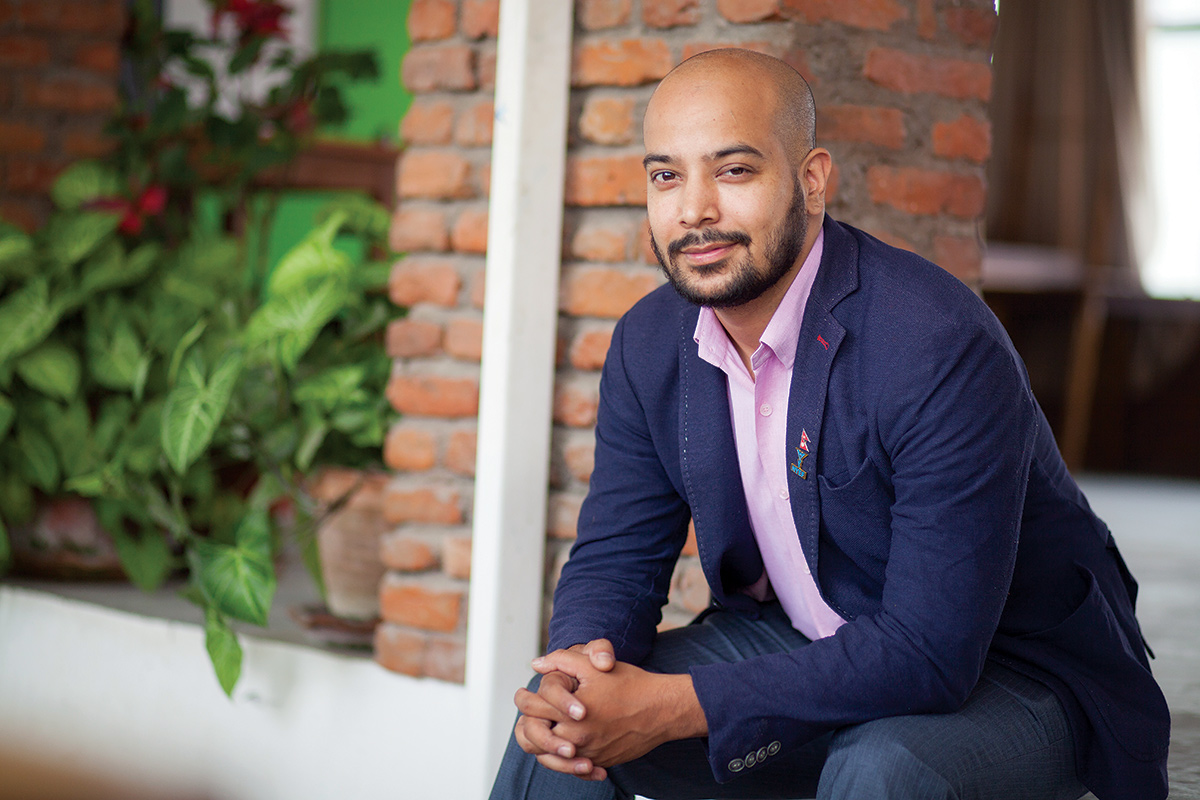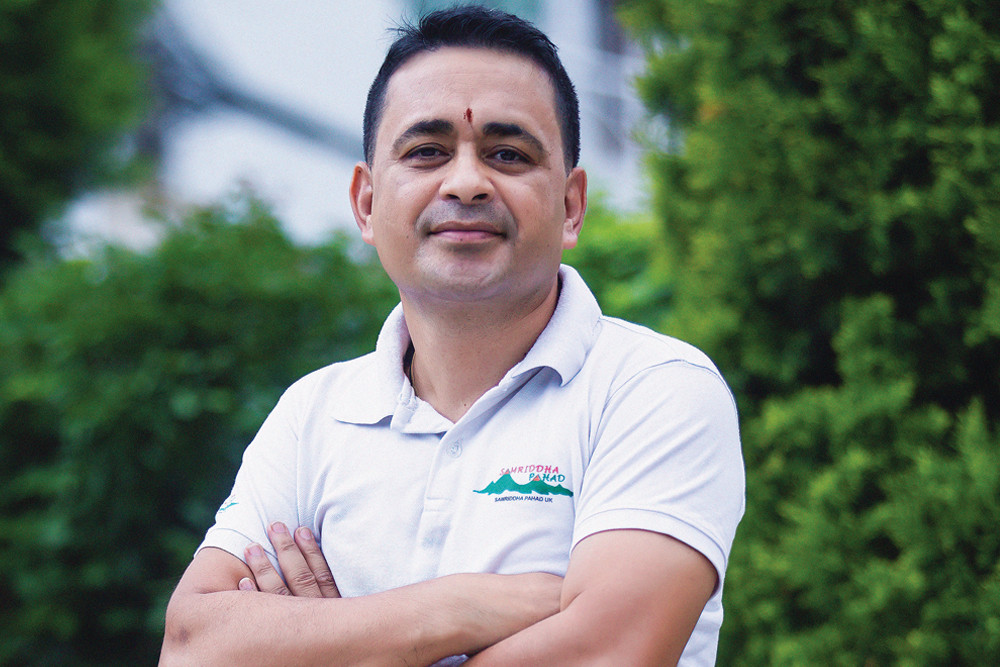
Pavitra Gautam, Co-Founder and Chief Executive Officer of Karkhana, considers himself an engineer by education, entrepreneur by profession and educator by passion. After deciding to do something in Nepal itself, he co-founded Karkhana – a value-driven education company and a makerspace whose programs are designed to stimulate creativity, critical thinking, risk-taking and the making skills necessary for innovation – in 2013.
“Karkhana is run by a team of technologists turned educators with a strong philosophy for education, thus bringing a strong understanding of the core skills needed in this tech-infused world,” shares Gautam.
Karkhana comprises of 55 members, and in last six years it has designed learning experiences for schools in curricular, co-curricular and extra-curricular segments reaching out to more than 4000 students a week in more than 50+ schools. With their head office in Kathmandu, Karkhana also operate in Biratnagar and Pokhara since 2018, and will be exploring new locations this year.
Before Karkhana, Gautam had co-founded Robotics Association of Nepal in 2010 after completing his engineering degree in electronics and communication. The organisation is better known for organising an annual event called Yantra – an art, tech and science festival. Gautam is also the Kathmandu Chapter’s President of Nepalese Young Entrepreneurs’ Forum (NYEF) and has been actively involved in mentoring young Nepali entrepreneurs along with contributing to entrepreneurial events such as Entrepreneurs Bootcamp, Young Entrepreneurs Summit and Made in Nepal Expo.
When asked how he would define ‘Leadership’, he said that leadership means adding value at any given moment and taking accountability of that change. “With this description what I am trying to imply is, leadership is not a position or post that is given to you as a gift but something that one has to earn and keep earning,” he elaborates. Gautam believes leadership can be very subjective and that there is no set definition of leadership except that a leader must keep adding value to a team, idea, and action.
In an interview with Dibesh Dangol of B360, Gautam also shared tips on motivation, spoke about the current entrepreneurial landscape in the country, and shared how he delegates responsibilities to team members at Karkhana. Excerpts:
Whose leadership style inspires you?
Personally, I like leading with purpose on the basis of both short and long term. One has to be driven by a vision while leading and thinking of strategies. One also has to have reasoning culture while leading and running short term tasks. I really like the leadership style of Simon Sinek which he advocates as a philosophy. On the other hand, I really like specific leadership styles of different people that I have seen in Nepal. Few names I can take now are Ajay Pradhananga of NPL, Shishir Khanal of Teach For Nepal, Ajay Shrestha of iCapital, and Niranjan Shrestha of Laxmi Group.
What are the most important values you demonstrate as a leader?
I believe in leading with purpose - what is the core idea that connects everything; sacrifice before glory - as a leader your sacrifices inspire people more than your glory which should be shared with your team; the concept of emergence - collective intelligence can be achieved by individual hard work; enjoy the moment and detach yourself from the end goal; and fail fast and fail often - the culture of experimentation.
Have you ever taken a leadership role without the title?
To begin with, I would say the position is the last thing I value as a leader. I usually tend to think of it as an outcome of taking the opportunity to add value. It’s really difficult to think of a particular time, but I guess taking lead in starting a robotics community in Nepal. Another would be starting Karkhana. It started with this idea that we can contribute to the innovation ecosystem in Nepal which has taken me into many positions like an engineer, an entrepreneur, and an educator.
What sort of leader does your team consider you to be?
I did a quick poll in Karkhana and asked my team the same question. Randomly the words they used to describe me as a leader were: fun, demanding about work, hard-working, friendly and empathetic, bold when it comes to work, focuses on collective growth, hard-headed, impatient at times and prompt.
How do you motivate your team?
My take on motivation is that intrinsic motivation is more important than extrinsic motivation. I try to help build intrinsic motivation in my team. Things I try are empathising with my team members, understanding their personal values and vision. Then, I try to build connections between their personal and organisational vision. I try to help them translate their personal values and help them align them with organisational values. I think of it as an ongoing process because with time these vision and values evolve and so does their meaning for organisation and its members.
What difference do you see between the current generation of entrepreneurs and those of the previous generation?
One thing I see in the current generation of entrepreneurs is lack of patience and getting frustrated too quickly. But I also see, there is more to entrepreneurship for the current generation of entrepreneurs. They are not just looking to generate financial gains but also making a social impact and living their passion. Another difference I have observed in the current generation is more of collaborative approach to problem solving, and also easy acceptance of new technology and new methods. However, I have seen many young people getting into start-ups without doing sufficient homework which not only frustrates them quickly but also finds them lacking in tools and ideas to support them in difficult times.
Have you ever been a mentor to another aspiring leader?
Yes, I have been a mentor to aspiring leaders. The best thing about mentorship is the process is equally educating to both parties. I always get to learn so much from my mentees as much as they expect to learn from my experiences. One of the difficult balances to have in these mentorship relationships is listening versus reflecting. You want to listen sufficiently that the person feels s/he has been heard but also reflect enough so that you can help the person think through the conversation and create new perspectives. I try to keep myself away from suggesting them specific direction; rather I try to help them create multiple perspectives and let them choose themselves. But, I am still learning how to be a good mentor. The joy of seeing someone grow that you have mentored is priceless.
How should a leader lead through change?
Human behaviour has evolved so much in the last decade. The way technology has fused with our lives is undeniably complex. Our fundamental lifestyle has changed. In these times, the way one should lead has to change for sure. Again for me the idea of leading is not just limited to people but also to ideas and actions. In any case, the way one can use technology to connect and communicate can be more efficient and effective. One challenge I have witnessed leading ideas, actions and people in these times is to keep up with change and its impact. Because today’s world is really fast moving, one has to keep evolving methods and find ways to keep leading.
Karkhana organises various events like Bhawishya, Bhawishya National Steam Camp and K Space; how do you organize and delegate responsibilities?
At Karkhana we try this idea called fluid hierarchy. In this model, first we try to see if anyone wants to lead an upcoming event and the person shouldn’t have to be already in the leadership position. We usually get few interests and we ask them to brainstorm a few ideas about how that particular event should be led. Usually, someone starts to emerge as a leader and sometime we see multiple people adding value where we let the pair/group take the lead. After that, everyone else follows. Regardless of the existing or previous role, we let the new team/person take full leadership. We believe these kinds of exercises help build more leaders in the organisation.
Karkhana works with children between 8-14 years of age. What is the future like for those children?
Entrepreneurs are usually hopeful people, and on top of that I am both an engineer and educator. I do see a better future for Nepal and our children. But I also believe that future is not hoped, it’s anticipated and many times created. Going back to my previous definition of leadership, its adding value at any given moment and taking accountability of that change. I do think currently we lack creating an environment where children learn through experience, comfortably fail and enjoy the process than focusing on just the outcome. If we want them to become leaders, we have to equip them with right skills and right attitude not just with good mark-sheets. Again I am not complaining as I am a product of this system; and as I am a product of this system I can say we need to evolve and rather than waiting for someone else to fix this, I am taking the accountability for this change.


.jpg)


.jpg)